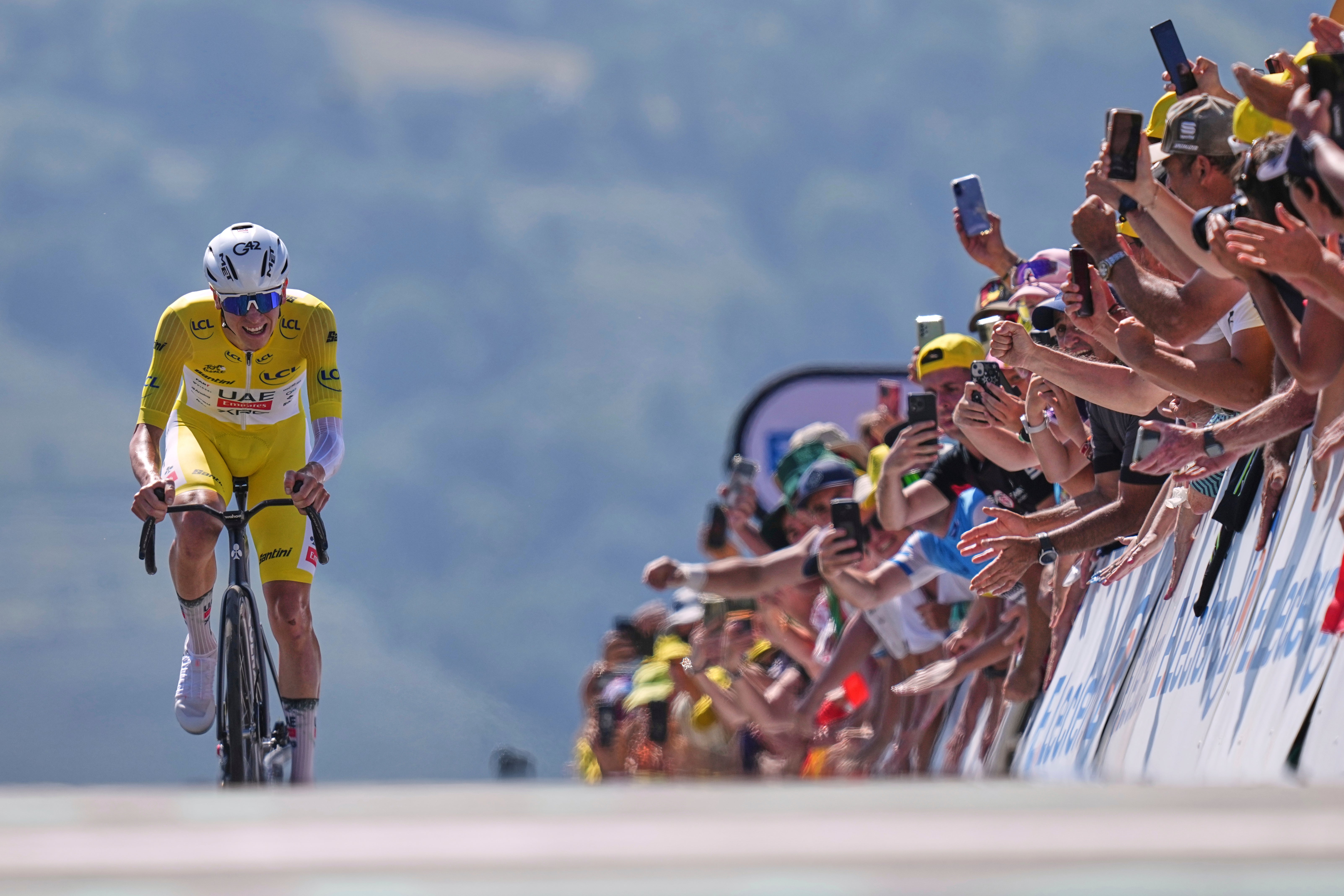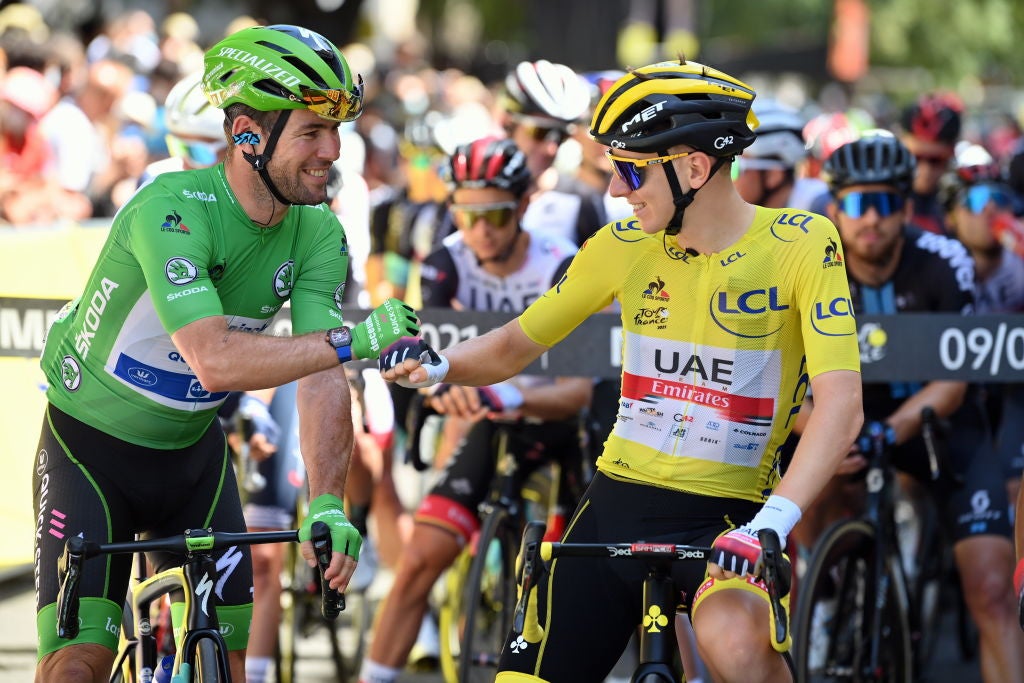
The battle for the Tour de France’s yellow jersey lasted 12 days, but really it lasted about five minutes. That’s how long Tadej Pogacar waited before attacking Jonas Vingegaard on the Hautacam, the first hors-categorie mountain of the Tour, with an acceleration that made the Danish double champion look like a weekend rider who’d taken a wrong turn.
There is still a week’s racing to come in the Alps, featuring a couple of menacing stages including Tuesday’s summit finish atop Mont Ventoux. But Ventoux is more likely to be where Pogacar writes another piece of Tour history than where Vingegaard trims his four-and-a-half-minute deficit.
As the remaining 167 riders recuperated in Montpellier on Monday, there were reminders of the Team Sky/Ineos era, when their dominance over the peloton was such that, at least in French media, they were portrayed as a boa constrictor squeezing all life and joy out of the race. Pogacar’s reign is different in that he pulls off virtuoso attacks even when his team don’t have full control of the peloton, but there is that same sense that we already know who will be wearing yellow in Paris.
“You build up to the Tour de France for months and months,” says Luke Rowe, the Team Sky/Ineos Grenadiers road captain who marshalled Chris Froome, Geraint Thomas and Egan Bernal to glory in the yellow jersey. “We talk about it all year, and what you hope doesn’t happen is you hit the first mountain stage and there’s a clear divide between first and second. You hope they go toe to toe like they did a few years ago – one got the lead, the other got the lead, they’re knocking lumps out of each other. But what you don’t want to see is the first HC mountain top finish, and one of them attacks with 10k to go and distances the other by two minutes.”

Pogacar tightened his grip with another win in the mountain time trial which followed, and added a few more seconds to his advantage by beating Vingegaard to second place on Saturday. At 26, the Slovenian is on the brink of adding a fourth yellow jersey to a palmares which includes the Giro d’Italia, the world title and nine Monument Classics. He is the best cyclist of his generation. He might be the most dominant athlete on the planet right now.
“It’s not just what he’s won, it’s how he wins it and the diversity of the races he competes in,” says Rowe. “Whatever the terrain, he’s one of the favourites. People sometimes compare Ineos to UAE and Poggy, but we were not close to what they’re doing. We focused on one race a year. We won the Tour de France but we weren’t that dominant. Poggy goes from UAE to Paris-Roubaix to Liege and goes bam, bam, bam, knocks seven shades of s*** out of everyone.”
Alongside his podcast with Geraint Thomas and his punditry duties – Rowe will be part of TNT Sports’ coverage for the final week of the Tour – he is a sporting director for French team Decalthon AG2R after hanging up the bike last year. So what would he choose now if he was on Visma’s team bus: keep attacking Pogacar knowing they’re doomed to fail? Or switch focus to stage wins and a podium place?

“I think their theory is, we will apply pressure any moment we can apply pressure over the course of three weeks. And the end result, they hope, is that in the third week Poggy has a bad day in cracks. That’s their battle plan and I think they have to continue to live by that battle plan, and their belief is that after 18 stages, Vingegaard deals with the fatigue better than Poggy does. They have to continue with that and hope that they do have a Poggy ‘I’m dead’ situation [when Vingegaard cracked Pogacar on stage 17 in 2023]. That’s what they’re praying for, that’s what they’re banking on.
“For a guy who’s won the Tour de France twice, does Vingegaard care if he finishes second or third or fourth? No. I’ve been in these situations with big leaders where they go, I’d rather risk everything to win and finish 10th than settle for third. But I would probably open the door up slightly to stage wins, like they did with Simon Yates a few days ago. I would open up a little bit – start taking the breakaway opportunities, obviously Wout [van Aert] can compete in the sprints and the punchy finishes. So continue with the battle plan, but maybe just put a little bit of focus on stage wins.”
The beauty of the Tour de France is in the many sub-plots that fizzle in the background, and there is still plenty of intrigue left in Jonathan Milan’s fight for a first green jersey, in Lenny Martinez’s bold bid to be the King of the Mountains, in Oscar Onley’s surprise podium bid, in the handful of stage wins that Pogacar decides not to have for himself.
But the bigger picture is how quickly Pogacar is surging towards Mark Cavendish’s record tally of 35 stages. When Cavendish finally set the new record last summer, Pogacar was one of the first to congratulate him. “Don’t beat it,” Cavendish joked to Pogacar. “I won’t!” came the response with a grin.

Pogacar had 14 stage wins then; now he has 21, with one or two more surely due this week, and why not: serious injury can strike at any time in this absurd sport and Pogacar must make hay while the sun shines on the Alpine roads. He is right to scoff at suggestions that he should hold back and allow lesser riders in breakaways to triumph. “I’m paid to win, not give away races,” he said last week.
Cavendish’s record was described by many, including on these pages, as insurmountable when he set it. But nobody counted on Pogacar being this dominant, on rewriting what’s possible in the sport. He could run at a modest 2.5 stages per Tour and have the record sewn up by the time he’s ready to ride off into the sunset.
“He’s not going to be riding the Tour de France when he’s 35 – maybe he will but I don’t think so,” adds Rowe. “But certainly until he’s 31, 32, he could still be winning stages of the Tour, so it’s vulnerable. If I was Cav, I’d be sleeping with one eye open.”
Watch coverage of every stage of the Tour de France live on TNT Sports and discovery+







